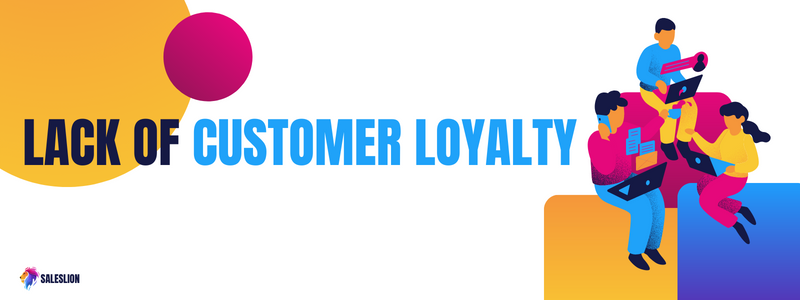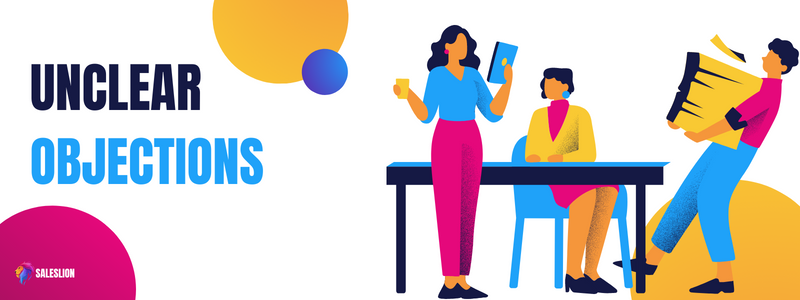7 Signs That Your Sales Team Is Dysfunctional

The world of sales is a rapidly evolving field that is transforming enterprise companies through innovative technological solutions. With this change comes the opportunity to re-evaluate the performance of your sales team through sales training so that your efforts are maximized.
A well-functioning sales team is the backbone of the success of any high-performing B2B company. And with a high-quality sales team, it is easy to attain revenue growth, strong customer relationships, and high close rates.
However, not all sales teams operate at peak performance.
Dysfunction can silently creep into any B2B sales team, hindering productivity, restricting growth, and negatively impacting the bottom line.
Are you a VP of sales noticing a decrease in your company’s sales team performance?
If so, then it may be time to consider investing in sales training and consulting.
In today’s article, we will explore the 7 signs that your sales team needs the sales training to realign for success in the competitive world of B2B sales.
Sign #1: Low Close Rates

One of the first signs that your sales team is dysfunctional is through low close rates. If your sales team is consistently failing to close deals, they will probably need additional guidance and support on how to effectively negotiate and persuade customers.
Below are some of the most common questions B2B companies ask about low close rates within their sales teams and how to improve them.
Why is my B2B close rate so low?
Close rates are often low in B2B companies for a wide range of reasons:
- Confused customers
- Lack of trust and credibility
- Slow response time
- Inadequate lead qualification
- Poor understanding of customer needs
- Weak value-proposition
If your customers are confused about who you are, the solution your company offers, or how you are going to be adding value to their lives, they probably won’t be convinced to close the deal.
Secondly, if your sales team is not ensuring quality customer service for your prospects early on in the sales process, they will probably drop out of the sales funnel because they are unsatisfied with your service. If the sales team fails to establish trust and credibility with potential customers, it becomes difficult to close deals.
And similarly, if your sales reps are taking their sweet time to respond to customer questions and concerns, the likelihood of another company jumping in before you have a chance to close is very high. Persistent and personalized follow-up is often necessary to keep prospects engaged.
Next, if the prospects being pursued are not fit for your company and solution and if they have not been properly qualified, a low close rate will often be the result.
A poor understanding of customer needs means that your sales team probably won’t be able to effectively communicate how their product or service can address those needs. This lack of personalization can drive a lot of prospective customers out of the funnel.
And finally, if the value proposition of the product or service is not clearly communicated or perceived as compelling by the potential buyers, it can restrict the close rate.
How can I improve my B2B close rate?
Responding to the key issues above, sales training and technologies can help B2B sales teams drastically improve their close rates. Consulting and digital sales rooms can help improve close rates by providing valuable resources, enhancing communication, and streamlining the sales process.
Digital sales rooms improve close rates by making the sales experience more interactive for customers, streamlining the process, and helping companies communicate their value proposition more effectively. They can also help sales reps to better understand customer pain points and problems through interactive tools like priority tables or solution boards.
And with sales training and consulting, B2B sales leaders will be able to improve their business and sales strategies and improve the sales process. Consulting can also help teams to personalize the sales process better for their customers in order to drive higher close rates.
What strategies can I use to increase my B2B close rate?
Fixing the problem of low close rates might not be quick, but it will be lifesaving for your business.
Firstly, sales consulting can help you analyze your sales process and identify where potential customers are dropping off. This will help you to identify the areas that need improvement. Another way to tackle this problem is by using a sales audit.
Next, it is important to ensure that your sales process starts on the right foot by focusing on lead quality. Using digital sales rooms can assist with this process by helping sales reps identify each prospect’s unique needs and wants early in the sales process. By doing this, your sales reps will not only be able to identify unqualified leads before too much effort is spent but they will also be able to better understand each customer and tailor the sales process to resonate with their unique pain points.
Improving communication can also be enhanced through sales technology like digital sales rooms. Using the data and analytics features of a sales room, sales teams can anticipate customer needs and respond to them before problems arise. This can greatly streamline the sales cycle.
Finally, the last strategy is simply to provide your sales team with expert sales training. If each of your sales reps is trained and ready to serve prospects and close deals, the problem of low close rates will be fixed quickly.
Sign #2: Lack of Customer Loyalty

Strong customer relationships are necessary for the success of your B2B company. If your customers aren’t happy, they won’t be returning for repeat business. And if customers are not returning for repeat business, it could be an indication that the sales team is not providing the best customer service experience.
What are the best practices for fostering long-term customer relationships in B2B?
Fostering long-term customer relationships is a crucial aspect of B2B success, as it leads to increased customer loyalty, repeat business, and referrals. To build long-lasting relationships, B2B companies should prioritize the following best practices:
- Actively listening to customers to understand their unique needs and pain points.
- Maintaining constant communication to ensure that the customers feel supported.
- Regularly assessing customer behavior through data and analytics in order to identify improvement.
- Building personalized experiences for your customers so that they receive exceptional customer service.
What are the reasons for the lack of customer loyalty in B2B?
A lack of customer loyalty in your B2B company can be detrimental to its success. Below are a few reasons why customers might be churning. With these insights, your team will be better equipped to respond to any problems and adjust accordingly so that your customer satisfaction rate increases.
Poor onboarding and lack of communication can significantly contribute to a lack of customer loyalty within B2B companies.
When new customers are not properly onboarded, they may experience confusion, frustration, and difficulties in understanding how to effectively use the products or services.
Additionally, if there is a lack of ongoing communication and support, customers may feel undervalued and neglected, diminishing their loyalty and increasing the likelihood of seeking alternatives. Effective onboarding and regular, transparent communication are vital in building trust, ensuring customer satisfaction, and fostering long-term loyalty in the B2B landscape.
Sign #3: Poor Product Knowledge

While poor product knowledge in your customers is a recipe for disaster when it comes to close rates, poor product knowledge within your sales team is even worse.
How to address poor product knowledge among B2B sales reps?
Addressing poor product knowledge among B2B sales reps is crucial to prevent negative impacts on their productivity and effectiveness at closing deals.
With this sign of dysfunction, it is best to address the problem early on to minimize any potential damage.
By investing in sales training and creating a culture of ongoing learning, sales reps can grow and improve their product knowledge, leading to enhanced sales performance and increased customer satisfaction.
What are the consequences of sales reps lacking product knowledge in B2B?
Imagine you were trying to explain a movie to someone that you didn’t even understand yourself. It would be pretty close to impossible to explain the movie accurately and in an engaging manner.
In the same way, the consequences of poor product knowledge are straightforward: if your sales reps don’t understand your product, your customers definitely won’t understand it either.
Without comprehension of the sales process, especially for B2B enterprise companies, you won’t be able to attract new leads or convert them into customers.
How can I assess and measure the product knowledge of my B2B sales team?
One of the best ways to get an outsider's opinion on whether or not your sales team lacks product knowledge is by conducting a sales audit.
A sales audit is an evaluation and analysis of an organization's sales processes, strategies, and activities. The aim of sales audits is to identify current constraints and receive feedback on ways to eliminate friction in the sales process.
With a sales audit and sales training, you will be able to uncover which areas are the biggest liabilities to your company’s profitability, including sales team performance and product knowledge.
Sign #4: Unclear Objectives

Unclear objectives are another sign that your sales team needs help. Whether it is a misalignment with organizational goals, a conflict between sales and marketing teams, or simply confusion on sales department direction, unclear objectives can lead to wasted effort and lost customers.
How to establish clear objectives for B2B sales teams that align with the overall business goal?
Establishing clear objectives for B2B sales teams that align with overall business goals requires two things:
- strategic planning
- collaboration between the marketing and sales teams
Strategic planning involves assessing the market, identifying target customers, and understanding their needs to create goals accordingly.
And collaboration between marketing and sales teams is essential to ensure that the objectives set for the sales team are aligned with the marketing strategies and overall business goals.
What are the consequences of unclear sales objectives in B2B organizations?
Unclear sales objectives in B2B organizations can lead to unuseful efforts, lost leads, and unsatisfactory service.
Sales objectives that are not clearly defined can lead to wasted efforts and resources being invested in the wrong areas.
Unclear objectives also make it difficult for sales reps to understand what success looks like and can result in missed opportunities.
What strategies or frameworks can help in setting measurable and achievable sales objectives in B2B?
One effective approach to setting measurable goals is to use the SMART framework. This stands for Specific, Measurable, Achievable, Relevant, and Time-bound and ensures that objectives are clearly defined, quantifiable, realistic, aligned with business priorities, and bound by a specific timeframe.
Additionally, focusing on KPIs relevant to the B2B sales process, such as conversion rates, average deal size, or customer acquisition cost, helps to set meaningful and measurable objectives. Being result-obsessed means constantly evaluating progress, adjusting strategies if necessary, and staying agile to achieve the desired sales outcomes.
Sign #5: Inability to Adapt

The B2B market is constantly changing, so if your sales team isn't able to keep up with the latest trends and technologies, they may need help staying ahead of the competition.
How can I help my sales team become more adaptable in the B2B environment?
One way to help your sales team become more adaptable in the B2B environment is by investing in constant sales training and consulting. By providing your team with the knowledge and skills necessary to navigate changing market dynamics and customer needs, they will be able to be more flexible and prepared for whatever changes your company might face. This is extremely beneficial for both the long-term health of your company and the service of customers.
Additionally, conduct frequent audits of sales strategies and processes. This will force teams to evaluate and adjust their approaches, fostering a sense of flexibility and adaptability. And by conducting audits frequently, your sales team will begin to realize the benefits of remaining flexible and responsive to change.
What are the consequences of sales teams lacking adaptability in B2B organizations?
When sales teams lack adaptability in B2B organizations, the consequences can be significant. The market and competition are constantly evolving, and if your sales team fails to adapt, you risk being left behind.
Customers' expectations and demands change over time, and failure to meet their evolving needs can result in a significant decrease in customer satisfaction. Furthermore, a lack of adaptability can hinder innovation, hinder growth, and limit your ability to respond effectively to competitive pressures.
Sign #6: Low Morale

A lack of enthusiasm among your sales reps can also lead to decreased productivity and poor performance overall.
While morale is not a KPI that can be tracked and analyzed like close rates or customer satisfaction, it is still an important indicator of a suffering sales team.
What are the reasons behind low morale in B2B sales teams?
Similarly to unclear objectives, low morale can stem from an absence of organizational purpose or vision.
By communicating your B2B company's goals and why they are important, you can foster a heightened sense of purpose within your sales team.
Also, by incorporating audits or other such feedback markers in order to highlight areas of improvement, constant change and adaptation can help remove monotony from day-to-day work.
What are the consequences of low morale in B2B sales organizations?
Similar to poor product knowledge, some areas of dysfunction can be contagious. If your sales team doesn’t understand the product, neither will your customers.
Likewise, if your team is unenthusiastic, your prospects will soon feel the same way.
When sales reps are demotivated, they are less likely to be engaged, productive, or proactive in their sales activities. This means that they are less likely to effectively prospect new leads, follow up with customers, and close deals.
This can undermine teamwork, reduce collaboration between departments, and decrease overall organizational performance. Ultimately, low morale can have disastrous effects on team efficiency within the early stages of your sales process which can create a ripple effect of lost leads, lost deals, and churned customers.
What strategies can I implement to improve morale and motivation in my B2B sales team?
One of the best strategies is to foster a culture of skill development and growth.
Investing in continuous sales training and development programs for your sales team can reignite motivation and effort.
Also, providing them with the tools and resources they need to succeed not only improves their performance but also shows that you value their professional growth and development. Digital sales rooms, among other sales enablement platforms, can help optimize their efforts and give them more time to build relationships with prospects rather than getting stuck with menial tasks like answering emails.
Other strategies include establishing a clear purpose and vision so that your team knows why they are doing what they are doing, offering variety and challenges to break up the monotony and enhance the work day, and fostering work-life balance to ensure your team is both mentally and physically healthy.
Sign #7: Limited Resources

The final sign that your sales team needs sales training is by relying on limited resources. If your team doesn't have access to the right tools or resources, it can make it difficult for them to succeed in their roles.
How can I maximize the effectiveness of my B2B sales team with limited resources?
Digital sales rooms can be a huge asset for streamlining your tech stack. By using an all-in-one sales tool like digital sales rooms, you can avoid dividing resources among multiple tools and streamline your sales operations.
By strategically allocating your limited resources, you can optimize their impact and drive greater results.
What are the consequences of operating a B2B sales team with limited resources?
Operating a B2B sales team with limited resources can result in stretched efforts and diminished outcomes. With limited resources, sales teams may struggle to cover all necessary activities, such as prospecting, lead generation, relationship management, and customer support.
This can lead to reduced capacity, slower response times, and missed opportunities.
How can I optimize the allocation of resources to ensure the success of my B2B sales team?
To optimize the allocation of resources and ensure the success of your B2B sales team, start by conducting a sales audit. Evaluate your sales processes and activities to identify areas that are consuming excessive resources or yielding poor results.
This analysis will help you identify inefficiencies, bottlenecks, and areas where resources can be better utilized. Continuously monitor and assess resource allocation to ensure ongoing optimization and adaptability in a resource-constrained environment.
Key Takeaways
In conclusion, recognizing the signs of a dysfunctional or undertrained sales team is essential for the success of any organization. By identifying and addressing these issues, businesses can take the necessary steps to improve sales team performance and drive better results.
If you are interested in learning more about how to best equip your sales team for success, reach out to us today for sales training.
Ready to reinvent your sales process and tools?
One quick call and we'll share our approach - no pressure.
Schedule your demo